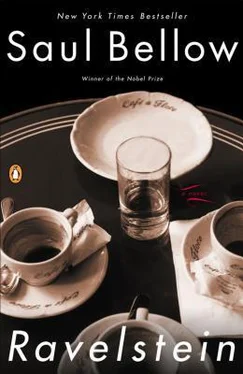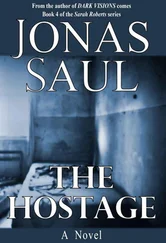"Yes," I agreed. "It has a specific kind of satisfaction, the bad of it guarantees it as real experience. This is what we go through, and it's what existence is like. The brain is a mirror and reflects the world. Of course we see pictures, not the real thing, but the pictures are dear to us, we come to love them even though we are aware how distorting an organ the mirror-brain is. But this is not the moment to turn metaphysical."
I was the sort of intensive care patient the staff would have made book on, if they had been the gambling sort. But these were people too serious to lay bets on whether you would survive. I'd run into some of them later in other departments of the hospital, and they'd say, "Ah, so you made it-wonderful! I wouldn't have guessed you would. Well… that was quite a fight you put up. I wouldn't have given two cents for your life."
And so… _hasta la vista__. We'll see each other in the life to come.
If these encounters had been longer (although I preferred them to be as short as possible) I should have mentioned my wife, given her due credit. Here and there a specialist materialized who had noted her: "What a pretty woman."
"How devoted she was." Often the relatives of the dying are like dazzled birds confused by the lights over center field, flying blind. But that was not the case with Rosamund. To save me she would have done whatever it was necessary to do. That was why, for her, the intensive care staff stretched the rules. They had a wide and complex knowledge of brothers, sisters, mothers, husbands, and wives. In my case survival was not a likely option, and she seemed to be backing a loser. To some others, mainly women, it would have seemed that Rosamund was keeping me on this side of the death-line.
Was love credited among these women with saving lives? If they were answering the questions of a pollster they'd have denied it. As Ravelstein had famously said, American nihilism was nihilism without the abyss. Love should by rights-or by modern lights-be seen today as a discredited passion, but the nurses in intensive care on the front line of death were more open to pure feelings than those who worked in the quieter corridors. And Rosamund, this slender, dark-haired, straight-nosed beauty was paradoxically recognizable as a natural. Although highly educated-a Ph. D., too smart to be taken in-she loved her husband. Love found secret support among these nurses in the end zone, eighty percent of whose cases ended in the morgue. The staff stretched the rules for her-for us. She was allowed to sleep beside the bed, in my cubicle.
When I graduated from the ICU they let Rosamund give a little supper. Dr. Bertolucci brought the pasta marinara from home. I sat up and ate a few forkfuls and lectured on cannibalism in New Guinea, where butchered enemies were roasted beside cliffs where they had tropical flowers dropping hundreds of feet, like waterfalls.
When I was sent down from intensive care, Rosamund was still allowed to come and go, free from all restrictions. After dinner she drove home in the Crown Vic. To reassure me she said, "It's stable, it's dependable. It's the cop car of choice, and I feel safe in it at a stoplight. For all the bad actors know, I'm a plainclothes police officer, and I carry a gun."
Even so, the side window was shattered one night in the parking lot behind our building. Nor did she like nightly to see the rats sit ting in rows where they could see and smell the odors of the restaurant on Beacon Street. "They're in rows like the jury in the jury box," she'd say, "and their eyes pick up all the light there is."
When she had limped up to the third floor the cat was there to greet her, or to accuse her of neglect. He was a country cat and had lived on mice and chipmunks and on birds. He now spent his days watching the grackles, blue jays, and giant crows. These look much bigger than crows in the woods-perhaps because of the smaller scale of domesticated city plants. Late in the afternoon they sound off from our rooftop like metal-saws.
I suppose it served some biological purpose but I was not interested. I was deaf to theory just then-just as I refused to think of what I was doing as a struggle for existence. If I had stopped to consider it, I would have been aware that I was underground digging myself out with bare hands. Some would have thought well of my tenacity or loyalty to life. To me it was no such thing-it was as dull as potatoes.
Rosamund after looking into the bare fridge (there was no time to shop) chewed some cheese rinds and then with her hair protected by a tall cone of turkish towels she stood under a hot shower. In bed, she telephoned her parents and chatted with them. Her alarm was set for seven, and she was at the hospital very early in the morning. She could name all the drugs prescribed for me, and the doctors found that she could tell them how I had reacted to each one, what I was allergic to, or what my blood-pressure readings had been the day before yesterday. There was an extended sorting apparatus in the pretty woman's head. She told me, confidently, that we would live to be very old, well into the coming century. She said I was a prodigy. I saw myself rather as a sort of freak.
There was no subject raised which she didn't immediately understand. Ravelstein would have been well pleased with her. Of course he'd never had my advantage, the access to her that I had. And after the crisis Rosamund said she never doubted that I would survive. And I seemed to believe that I wouldn't die because I had things to do. Ravelstein expected me to make good on my promise to write the memoir he had commissioned. To keep my word I'd have to live. Of course there was an obvious corollary: Once the memoir was written, I lost my protection, and I became as expend able as anybody else.
"But that couldn't apply to you," said Rosamund. "Once you had felt your way _up__ to it, nothing could have held you back. Besides, you'd survive for my sake."
I often recalled asking Ravelstein which of his friends were likely to follow him soon. "To keep you company," was the way I put it. And after he had thoroughly examined my color, my wrinkles, my looks, he said that I was the likeliest to follow. He was like that. If you asked him to be direct he wouldn't spare you. His clarity was like a fast-freezing fluid. Did he mean that I would be the first of his friends to join him in the afterlife? This was what the tone of our exchange suggested. But then he didn't believe in an afterlife. Plato, by whom he was guided in such matters, often spoke of a life-to-come but it was difficult to say how seriously he took this. I was not about to get into the rink with this Sumo champion representing Platonic metaphysics. One bump of his powerful belly and I'd be out of the brilliant ring and back again in the noisy dark.
He had, however, asked me what I imagined death would be like-and when I said that the pictures would stop he reflected seriously on my answer, came to a full stop, and considered what I might mean by this. No one can give up on the pictures-the pictures might, yes they might continue. I wonder if anyone believes that the grave is all there is. No one can give up on the pictures. The pictures must and will continue. If Ravelstein the atheist-materialist had implicitly told me that he would see me sooner or later, he meant that he did not accept the grave to be _the__ end. Nobody can and nobody does accept this. We just _talk__ tough.
So when I made my remark about the pictures, Ravelstein had given me his explosive laugh-stammer: "Har har." But he had some regard-some respect for the answer.
But then he let himself go so far as to say, "You look as if you might by and by be joining me."
This is the involuntary and normal, the secret, esoteric confidence of the man of flesh and blood. The flesh would shrink and go, the blood would dry, but no one believes in his mind of minds or heart of hearts that the pictures _do__ stop.
Читать дальше












